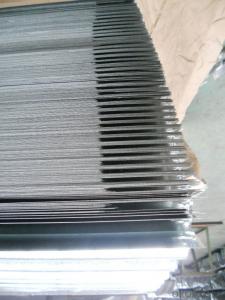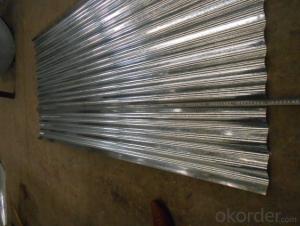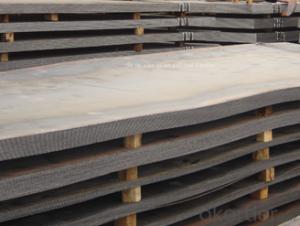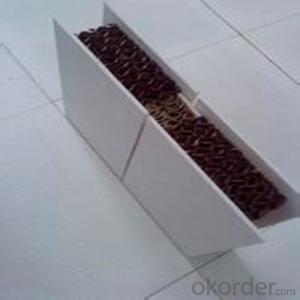Corrugated steel sheet
- Loading Port:
- China Main Port
- Payment Terms:
- TT OR LC
- Min Order Qty:
- -
- Supply Capability:
- -
OKorder Service Pledge
OKorder Financial Service
You Might Also Like
Corrugated steel sheet is the colored steel plate which has been wave formed with the cold rolling treatment, trough especial coated dispose, the color coated steel panel’s guaranty is 12-15 years.
It has been widely applied on civil construction like storerooms, special building roof and walls of wide-span steel structure building and so on.
Pressing steel panel with the clear line, and many colors for choice, suitable for any different building style materials, achieving satisfy effects;
Pressing steel panel can be freely incised, it can satisfy the especially designing demands. It apply on convenient construction, and anti-seismic performance, fire proof, waterproof, free of maintenance, ect.
CORRUGATED HOT DIPPED GALVANIZED STEEL SHEETS
THICKNESS TOLERANCE: (+/-0.01mm)
ZINC COATING: 50g/m2
WIDTH: 900mm (AFTER FORMING)
STANDARD:JIS G 3302, SGCH
SURFACE:REGULAR SPANGLE, CHROMATED, DRY
PACKAGE: 2- 3 TON/PALLET
SPECS: 0.18mm X 900mm X 2000mm
Specifications
1. Zinc coating :60-180g( as required)
2. thickness:0.14-0.80mm
3. width:700-1250mm( 750mm,900mm,1215mm,1250mm,1000mm the most common)
6. surface:regular/mini/zero spangle, chromated, skin pass, dry etc.
- Q:How are steel sheets protected during storage and handling?
- Steel sheets are typically protected during storage and handling through various measures such as applying a protective coating, using separators to prevent direct contact, and storing them in a controlled environment to avoid moisture and corrosion.
- Q:How do steel sheets perform in harsh chemical environments?
- Steel sheets generally perform well in harsh chemical environments due to their inherent strength and resistance to corrosion. However, the specific performance of steel sheets in such environments depends on factors such as the type and concentration of chemicals, temperature, and exposure duration. In some cases, additional protective coatings or treatments may be necessary to enhance the steel sheets' resistance to chemical corrosion.
- Q:How do steel sheets perform in terms of vibration damping?
- Steel sheets perform fairly well in terms of vibration damping. Due to their high density and stiffness, they have the ability to absorb and dissipate vibrations effectively, reducing noise and vibration levels. However, compared to other materials like rubber or polymers specifically designed for vibration damping, steel sheets may not provide the same level of damping efficiency.
- Q:Can steel sheets be used for clamps or fasteners?
- No, steel sheets themselves cannot be used directly as clamps or fasteners. However, steel sheets can be used to manufacture clamps or fasteners. Steel sheets can be cut, shaped, and manipulated to create various types of clamps and fasteners such as brackets, plates, or strips. These manufactured components can then be used as clamps or fasteners in different applications, providing strength, durability, and secure attachment. So while steel sheets themselves cannot function as clamps or fasteners, they can be transformed into the necessary components to serve these purposes.
- Q:How do steel sheets compare to wood sheets?
- Steel sheets and wood sheets have distinct differences in terms of strength, durability, and use cases. Firstly, steel sheets are known for their exceptional strength and durability. They can withstand heavy loads, extreme weather conditions, and are highly resistant to warping, rotting, and insect damage. Wood sheets, on the other hand, are less robust and can be vulnerable to moisture, termites, and decay if not properly treated or maintained. In terms of versatility, steel sheets offer a wide range of applications. They are commonly used in construction, automotive, and manufacturing industries due to their high tensile strength and structural stability. Wood sheets, on the other hand, are often used in interior design, furniture making, and smaller-scale construction projects due to their natural aesthetic appeal and ease of manipulation. Additionally, steel sheets are fire-resistant, making them a safer option compared to wood sheets, which are combustible and can contribute to the spread of fire. Steel sheets also have a longer lifespan, requiring less maintenance and replacement compared to wood sheets, which may need regular refinishing, sealing, or replacement due to wear and tear. However, wood sheets have their advantages as well. They are typically more cost-effective than steel sheets, making them a popular choice for budget-conscious projects. Wood sheets also have better insulation properties, providing natural warmth and soundproofing qualities. Ultimately, the choice between steel sheets and wood sheets depends on the specific requirements of the project, including factors such as budget, desired aesthetics, structural needs, and environmental considerations.
- Q:The method of making spring steel for automobile?
- You can't put it in the water before the knife has been molded. Fully built, then heat treatment [put into the water], and then sharpening.
- Q:Can steel sheets be used for walkways and platforms?
- Yes, steel sheets can be used for walkways and platforms. Steel sheets are durable, strong, and capable of supporting heavy loads, making them suitable for such applications. Additionally, they can be fabricated and designed to meet specific requirements, ensuring safety and stability for users.
- Q:Can steel sheets be used for HVAC applications?
- Indeed, HVAC applications can utilize steel sheets. In the realm of HVAC ductwork construction, steel sheets are frequently employed owing to their robustness, longevity, and fire-resistant qualities. These sheets can be effortlessly molded into diverse configurations and dimensions, tailored to the precise needs of HVAC systems. Moreover, steel sheets exhibit resistance against corrosion, a pivotal attribute in HVAC applications where moisture and condensation may manifest. All in all, steel sheets are a fitting material option for HVAC applications, given their mechanical characteristics and capacity to endure the demands of heating, ventilation, and air conditioning systems.
- Q:Are steel sheets available in textured finishes?
- Yes, steel sheets are available in textured finishes. Textured finishes can be achieved through various processes such as embossing, etching, or brushing. These techniques create patterns or textures on the surface of the steel sheet, giving it a unique and visually appealing appearance. These textured finishes not only enhance the aesthetic appeal of the steel sheet but also provide functional benefits like improved grip, reduced glare, or increased durability. Different types of textures can be applied to steel sheets to suit different applications and design preferences.
- Q:What is the typical weight of steel sheets?
- The typical weight of steel sheets varies depending on their size, thickness, and type of steel being used. Generally, steel sheets can range in weight from a few pounds to several tons. For example, a standard 4x8 foot steel sheet with a thickness of 1/4 inch can weigh around 110 pounds, while a larger 10x10 foot sheet with a thickness of 1 inch can weigh over 1,000 pounds. It is important to note that these are just general estimates, and the weight can vary based on specific factors such as the alloy composition or any additional coatings applied to the steel sheets.
1. Manufacturer Overview |
|
|---|---|
| Location | |
| Year Established | |
| Annual Output Value | |
| Main Markets | |
| Company Certifications | |
2. Manufacturer Certificates |
|
|---|---|
| a) Certification Name | |
| Range | |
| Reference | |
| Validity Period | |
3. Manufacturer Capability |
|
|---|---|
| a)Trade Capacity | |
| Nearest Port | |
| Export Percentage | |
| No.of Employees in Trade Department | |
| Language Spoken: | |
| b)Factory Information | |
| Factory Size: | |
| No. of Production Lines | |
| Contract Manufacturing | |
| Product Price Range | |
Send your message to us
Corrugated steel sheet
- Loading Port:
- China Main Port
- Payment Terms:
- TT OR LC
- Min Order Qty:
- -
- Supply Capability:
- -
OKorder Service Pledge
OKorder Financial Service
Similar products
New products
Hot products
Related keywords






























